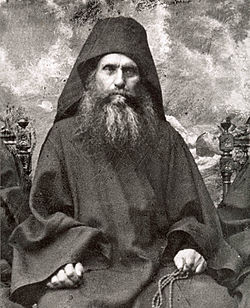Silouan the Athonite (Russian: Силуан Афонский) also sometimes referred to as Silouan of Athos, Saint Silvanus the Athonite or Staretz Silouan (January 17, 1866 – September 24, 1938) was an Eastern Orthodox monk of Russian origin, born Simeon Ivanovich Antonov who was a poet and monk of the St. Panteleimon Monastery.[1] The life and teachings of Saint Silouan were brought to light by his disciple, Archimandrite Sophrony (aka Saint Sophrony the Athonite, Saint Sophrony of Essex) in his classic book Saint Silouan the Athonite.
Saint Silouan the Athonite | |
|---|---|
 | |
| Born | January 17, 1866 Shovskoye village, Lebedyan County, Tambov Governorate, Russian Empire |
| Died | September 24, 1938 (aged 72) Saint Panteleimon Monastery, Mount Athos, Greece |
| Venerated in | Eastern Orthodox Church |
| Canonized | 1987 by Ecumenical Patriarchate of Constantinople |
| Feast | September 24 (NS) 11 (OS) |
Life
editHe was born Simeon Ivanovich Antonov, of Russian Orthodox parents who came from the village of Shovskoye in Imperial Russia's Tambov Governorate. At the age of twenty-seven, after a period of military service in the Imperial Russian Army, he left his native Russia and came to the monastic state of Mount Athos (an autonomous peninsula in Greece) where he became a monk at the Monastery of St Panteleimon, known as "Rossikon", an Orthodox monastery that houses Russian monks yet is, as all the Athonite monasteries, under the jurisdiction of the Patriarch of Constantinople. There, was given the name Silouan (the Russian version of the Biblical name Silvanus).
An ardent ascetic, he received the grace of unceasing prayer and saw Christ in a vision. After long years of spiritual trial, he acquired great humility and inner stillness. He prayed and wept for the whole world as for himself, and he put the highest value on love for enemies. He became widely known as an elder. Silouan died on September 24, 1938. His memory is celebrated on September 24.
Though barely literate, he was sought out by pilgrims for his wise counsel. Saint Silouan while still alive entrusted his writings to his disciple Father Sophrony, who was still a deacon at that time. Father Sophrony several years later travelled to Paris with the intention to publish the writings of his Elder. The first publication of his writings came out in Slavonic but very soon the book was translated into French and English as well as many more languages later.
The text Adam's lament is a poem written by Saint Silouan contained in Part II - Chapter 18 of the book Saint Silouan the Athonite. The Estonian composer Arvo Pärt composed a classical choir piece with the lyrics based on this text.
Monk Silouan was canonized as a Saint by the Ecumenical Patriarchate in 1987.
Quotations
edit- Those who dislike and reject their fellow-man are impoverished in their being. They do not know the true God, who is all-embracing love.
- Keep your mind in hell and do not despair, said to be a teaching Jesus Christ told him in a dialogue they had. After demons surrounding him weren't allowing him to pray, he looked up at the sky and said: Lord, you see that I want to pray to you, but they won't let me. The Lord then appeared to him and told him: The prideful ones always suffer this way. So Siluan asked: Lord, how can I become humble? And the Lord replied: Keep your mind in hell and do not despair.
- The soul that is in all things devoted to the will of God rests quiet in Him, for she knows of experience and from the Holy Scriptures that the Lord loves us much and watches over our souls, quickening all things by His grace in peace and love. Nothing troubles the man who is given over to the will of God, be it illness, poverty or persecution. He knows that the Lord in His mercy is solicitous for us. The Holy Spirit, whom the soul knows, is witness therefore. But the proud and the self-willed do not want to surrender to God's will because they like their own way, and that is harmful for the soul. (From the Life and Teachings of Elder Siluan by Bishop Alexander and Natalia Bufius translated by Anatoly Shmelev)
- The condition of peace among men is that each should keep a consciousness of his own wrongdoing
- Understand two thoughts, and fear them. One says, "You are a saint," and the other, "You won't be saved." Both of these thoughts are from the enemy, and there is no truth in them. But think this way: I am a great sinner, but the Lord is merciful. He loves people very much, and He will forgive my sins.
References
edit- ^ John Anthony McGuckin The Encyclopedia of Eastern Orthodox Christianity 2011 St. Silouan of Athos (1866-1938) JULIA KONSTANTINOVSKY St. Silouan of Athos, also known as Silvanus, was born Simeon Ivanovich Antonov of Russian peasant origin, and became a schema-monk of the St. Panteleimon monastery on Mount Athos
Further reading
edit- Archimandrite Sophrony. Saint Silouan the Athonite. Stavropegic Monastery of St. John the Baptist. ISBN 978-0-951-27868-0
- Bishop Alexander and Natalia Bufius; translated by Anatoly Shmelev. The Life and Teachings of Elder Siluan. Missionary Leaflet #EA17 Holy Trinity Orthodox Mission, 466 Foothill Blvd, Box 397, La Cañada Flintridge, CA 91011
External links
edit- Photographs of Saint Silouan the Athonite
- Silouan the Athonite
- On the Will of God by Staretz Silouan of Mt. Athos
- The Theology of St. Silouan, Archim. Zacharias Zacharou (video lecture)